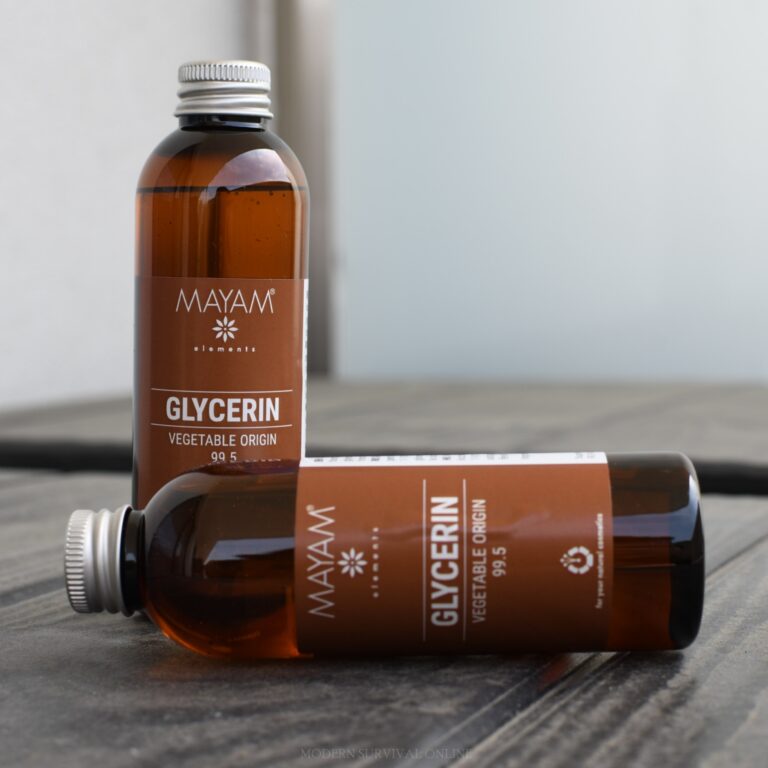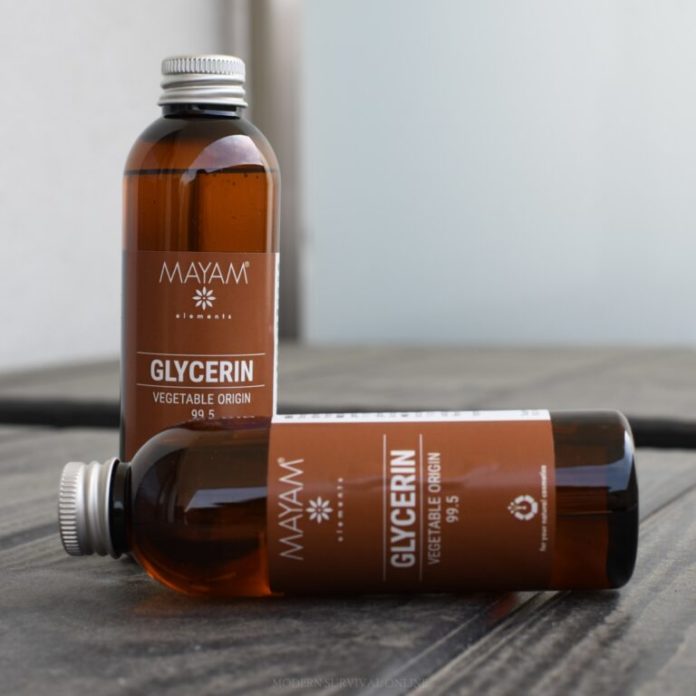Smart preppers will always attempt to cover as many bases as possible with their supplies and provisions.
Flexible, multi-purpose items are often the key to success in long-term survival situations, since they will help you adapt to changing conditions and unexpected needs.

One area where some preppers could use a little help is on the subject of basic chemistry, particularly in stocking simple chemicals and compounds that are affordable in bulk and suitable for a variety of purposes.
One excellent compound in this regard is glycerin, a simple polyol.
Glycerin has all kinds of uses and is found in countless products, including medicines, hygiene products, makeup, automotive and industrial chemicals, and even in many foods.
It is supremely adaptable, overwhelmingly safe and incomparably useful which means you’ll definitely want to have some on hand.
If you don’t have any glycerin on hand you are definitely missing out!
Remedy that personal shortage post-haste because in this article will be sharing with you eight clever uses for glycerin that can help your cause in a survival situation, both long and short-term.
What is Glycerin and Where Does It Come From?
Glycerin, more properly called glycerol, is a polyol compound. It is notable for having both antiviral and antibiological capabilities, and appears as a slightly viscous liquid that is both odorless and colorless.
Interestingly, glycerin tastes sweet and can actually be added to various foods as a sweetener, though this should be done sparingly or with the express understanding that it has a fairly pronounced laxative effect in high concentrations.
Glycerin has many applications in many sectors, and is typically obtained from animal or plant sources or it naturally occurs in triglycerides.
Saponification, transesterification and hydrolysis of those triglycerides produces glycerin and variations thereof.
Plant-derived glycerin is typically obtained from palm or soybean plants, and animal tallow is a primary source for animal-derived glycerin.
Glycerin is an extremely common and inexpensive product, with the United States alone producing in excess of 350,000 tons per year with it selling for only a few cents per kilogram.
Notably, glycerin as it is typically obtained is typically crude and not particularly useful at the individual level.
Purified glycerin is more common at the retail level, but purification of the compound is expensive and this drastically increases cost by the time it reaches the point of sale.
Nonetheless, glycerin as suitable for our purposes is reasonably affordable in bulk or in smaller quantities, and you’ll definitely want to have some on hand.
It is commonly available at drug stores, at the pharmacy section of big-box department stores and online. We will provide you with the reasons why you’ll want to keep this wondrous compound on hand in the next section!
8 Clever Survival Uses for Glycerin

Lip Balm
Glycerin is renowned for its moisturizing properties, and also for its antimicrobial and antiviral capability. This makes it a perfect moisturizing lip balm, especially suited for use in harsh conditions.
Compared to some other traditional or alternative lip balms, glycerin is the least likely to irritate existing damage or cause adverse effects when used regularly over time.
All that is needed is a small dab that can be spread around evenly to coat your lips.
This will protect you from harsh, cold wind in particular, so apply generously and keep a small quantity handy whenever you’ll be working outside.
You might think that chapped lips are the least of your problems in a survival situation, but it is an easy thing for harsh conditions to painfully crack and split your lips, making them vulnerable to infection. Don’t risk it; keep them supple by applying glycerin to them regularly!
Heal Cracked or Damaged Skin
Glycerin has long been used as an ingredient in all sorts of topical medications for its healing properties.
In fact many products you purchase for the purpose of healing minor skin injuries and ailments get their healing properties predominantly from glycerin and nothing more.
Considering how widespread this use is you should probably call that a clue!
Take advantage of glycerin’s healing properties by applying it to any cracked or damaged skin that you might have.
It works well for the treatment of bug bites, shallow scrapes and punctures, psoriasis, eczema and similar ailments, and even treating burns.
Yes, believe it or not glycerin makes an excellent burn treatment so long as you aren’t dealing with a truly dreadful burn of the third degree or worse.
First and second degree burns can be treated reliably with a glycerin application.
Glycerin, and its typical over-the-counter strength, is ready to use as-is on all of the maladies mentioned above and then some.

Moisturize Skin
Glycerin is a superb moisturizer for your skin, and has long been used as a treatment for working hands and feet.
Anyone who is on their feet for long periods of time for work, pleasure or otherwise knows that heels and the balls of your feet can become work hardened and then crack open painfully.
The same thing can happen to your hands, particularly the ends of your fingers. All of this is only exacerbated by harsh weather conditions and exposure to dirt, grit and chemicals.
Regular treatment with glycerin at the end of every workday or even every other day, will dramatically reduce the likelihood that your skin will dry out and crack for any reason.
Aside from keeping your skin soft, supple and pleasant to touch, you’ll be protecting and repairing your skin so you can keep on working without any impairment.
All you need to do is massage glycerin into the affected areas or likely trouble areas on your skin and give it a little bit of time to absorb before going on about your day.
It will leave a residue behind for some time, so don’t do this immediately prior to work when you need to be sure of your grip.
Treating Sores or Injuries in Mouth
Considering all the things it can do, it is understandable that you might be wary of putting glycerin in your mouth for fear of side effects or poisoning, but glycerin is extremely safe and even edible in surprising amounts.
The worst thing that will happen is it might have a laxative effect, but we’ll talk about that later.
More germane to this topic is it means you can use glycerin to treat sores or injuries in the mouth in the same way you would external injuries elsewhere on your body.
Canker sores, ulcers, split gum lines and other injuries or painful boo-boos that occur in the mouth can undergo accelerated healing and pain relief with regular application of glycerin.
The stuff even tastes sweet so it won’t be nasty or unpleasant to treat these injuries accordingly.
All that is needed is dabbing a little bit on with a q-tip, cotton swab or even a clean finger and then leaving it alone to work for a little while.
Again, you needn’t to worry if you accidentally swallow a little bit of the glycerin; it will not hurt you!

For Soap-Making
For readers that use modern “big brand” soaps you have probably experienced the drying effect they have on skin, often leaving you feeling parched and strangely clingy.
This is because they only remove moisture from your skin, they don’t add it.
As it turns out, this is because many big time, major brand soap makers remove and sell the glycerin from their soaps that is created during the soap making process.
Old fashioned soaps from yesterday year typically left this glycerin in.
As you might expect, leaving the glycerin in soap, as typified by cold process pressed soaps, results in a product that will nourish your skin as it cleans, or at worst it will not make your skin any worse off than it was prior to bathing.
Many preppers know a thing or two about soap making and have learned how to implement the process to supplement their own supplies in long-term survival situations.
Adding glycerin directly to your own soaps as an ingredient will only improve them and make your soap less harsh on your skin.
The precise ratios and timing of adding glycerin to homemade soap is a topic that is beyond the subject of this article, but it is a simple affair as glycerin was for a long time a common ingredient in many soaps.
As a Laxative
Dealing with constipation in a reliable, yet gentle, way is far easier said than done. Anybody who has had an unfortunate, ah, mishap with over-the-counter laxatives will definitely confirm this!
Once again, glycerin seems to be the fix for such problems.
As mentioned above, glycerin is edible, and is even used as a sweetener in various foods particularly those where carbohydrate loads want to be kept to a minimum, for instance in making sugar-free or diabetic friendly foods.
One side effect of glycerin consumption is a noticeable increase in bowel movements, particularly a reduction in straining needed to produce a movement.
You can consume glycerin sparingly as-is to promote this laxative effect or simply increase its inclusion in various foods to get the same thing.
Alternatively, glycerin may be used as a manually applied suppository to promote the same effect from the opposite end, or even as a high-volume enema as a solution with water.
Glycerin suppository tablets have long been on the market and favored by some for the purpose, also.
If used in this way you don’t need to do anything else, as the glycerin will take effect on its own after application.
Take care, as the onset of effects can be sudden for some folks. You have been warned.

Fire Starting
Glycerin also, incredibly, serves as one component in a binary fire starter, one that will burn furiously and reliably ignite even damp kindling.
Hard to believe this wondrous compound that can do so much, and is even safe to eat, can spontaneously combust in the right conditions!
But, it is true, and you can use this capability reliably and safely so long as you pay attention to your proportions and employ all necessary safety measures.
Glycerin, when combined with equal parts potassium permanganate, will rapidly oxidize and then combust, igniting anything it is placed on.
Potassium permanganate is another chemical you should have on hand, and we’ll talk about that in another article, but assuming you have both compounds all you’ll need to do to prepare is create a suitable spot for your fire, particularly one in a shallow depression to help catch any jumping sparks.
Then combine the two compounds, step back, and enjoy the sudden emergence of a bright, purplish flame before it settles down into a crackling fire.
For Mouthwash
Another great, oral use for glycerin is as an antiseptic mouthwash. This is another way to help treat any sore spots in your mouth but also a way to freshen your breath by killing bad bacteria.
Glycerin’s antiseptic properties remain even when it has been diluted, and an effective mouthwash can be made by combining it with water until a thin solution results.
Then, as usual, pour the solution into your mouth before swishing, gargling and finally spitting after about 30 seconds.
Daily use of this glycerin solution has no side effects, but since you are mixing it on your own do take care if you are using an unknown concentration of glycerin.
With regular use you should notice considerably fresher breath and a healthier mouth overall. Just another great perk of glycerin!
Get Some Glycerin Today!
If you cannot tell by now, glycerin is an extremely versatile, adaptable and affordable chemical compound that is already present in countless products across dozens of sectors.
It is universally useful for all sorts of things, and not just on an industrial scale. Clever preppers can make use of glycerin properties for their own purposes, as medicine and more.
A good supply of glycerin should be a priority prep for everyone!


